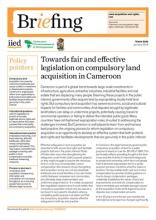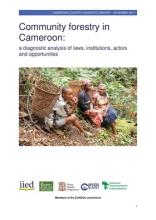Land Library
Welcome to the Land Portal Library. Explore our vast collection of open-access resources (over 74,000) including reports, journal articles, research papers, peer-reviewed publications, legal documents, videos and much more.
/ library resources
Showing items 1 through 9 of 14.OpenCommunityContracts.org is a repository of publicly available community-investor or community-government contracts and agreements relating to agriculture, forestry, mining, oil and gas extraction and other natural resource projects.
From the mid-2000s, a commodity boom underpinned a wave of land use investments in low- and middle-income countries.
This brief, reviews recent international gas developments, the outlook in this regard and implications for the development of proposed offshore gas projects in Tanzania.
Cameroon is part of a global trend towards large-scale investments in infrastructure, agriculture, extractive industries, industrial facilities and real estate that are displacing many people.
In Cameroon, commercial and infrastructural developments are exerting increasing pressure on land and natural resources, which is in turn exacerbating the risks to the rights of indigenous peoples.
This brief study has been produced by the partners of the CoNGOs consortium to share our different knowledge and experience, and to set out a joint understanding of the current state of play in relation to community forestry in Cameroon.
This document provides practical guidance to address the taxation of Indirect Transfers of assets of extractive industries. It focuses on issues that developing country governments may wish to consider if they adopt a policy to tax such transfers.
After natural disasters, governments often relocate vulnerable urban communities in the name of humanitarian relief. But urban communities rarely welcome such relocation, since it frequently exacerbates their daily challenges or creates new risks.
An estimated 60 per cent of the world’s 17 million refugees currently reside in cities, where they often lack access to financial assistance and legal protection.(1) In their absence, dis








